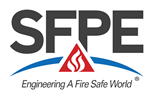FEMTC 2018
Effect and Appropriate Use of TIME_SHRINK_FACTOR in FDS 
Rosalie Wills - Koffel Associates, Inc.
Abstract
The Fire Dynamics Simulator (FDS), developed by the National Institute of Standards and Technology (NIST), is used frequently for various fire protection engineering applications FDS uses Large Eddy Simulation (LES) techniques to solve the Low Mach Number form of the Navier-Stokes equations It is used in a variety of fire protection designs where prescriptive requirements may not be applicable or feasible Some of these applications are the analysis of smoke control systems, exterior building exposure, alternate materials, and/or alternate fuel load and/or arrangement.
One of the major limitations of FDS is that it requires significant computational time and capacity With ever increasing complexity of the built environment, FDS simulations require numerous central processing units (CPU) and is typically run on a dedicated server Even then, these simulations can take on the order of weeks to run Within FDS, there is a command “TIME_SHRINK_FACTOR” which reduces the time necessary to transfer heat to surfaces by reducing the specific heat of the materials by that factor The FDS user guide states that this can be used in steady-state applications and provides a reference for a simple steady-state case.
This research will focus on using this factor and analyze how it affects both the model results and run-time simulations with regard to the applications listed above The simulations will be run both with and without the factor Wall temperature, air/smoke temperature, smoke movement, soot concentration, and incident heat flux will all be evaluated The analysis will describe the similarities or differences of the results that the simulation with the factor produced, and assess the ability to use the factor properly This research will summarize when the TIME_SHRINK_FACTOR is appropriate for fire protection design applications, its capabilities of reduced run-time, and the limitations of its use.
Presentation
Resources
| Paper | Presentation | ||
|---|---|---|---|
| HTML | HTML | ||
| Resources Archive File (.zip) | |||

